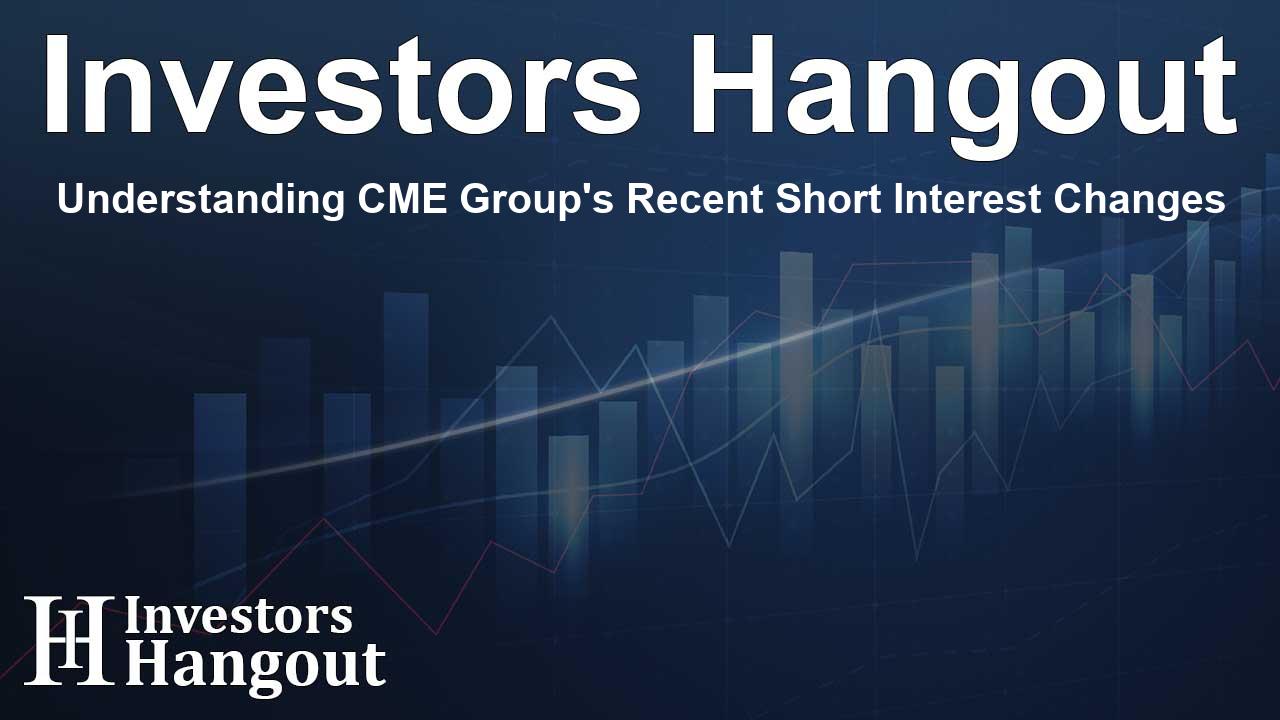Understanding CME Group's Recent Short Interest Changes

Understanding CME Group's Recent Short Interest Changes
CME Group (NYSE: CME) has experienced a notable increase in its short interest, which has risen by 5.94% since the last report. Currently, the company has reported approximately 3.83 million shares sold short, amounting to about 1.07% of all available trading shares. With the current trading volume, it would require traders about 2.71 days to cover their short positions on average.
What Is Short Interest and Its Importance?
Short interest refers to the total number of shares that have been sold short and have not yet been covered. Short selling involves selling shares that the trader does not own, banking on a decrease in the stock price. If the price falls, the trader profits, but losses occur if the price rises.
The Significance of Monitoring Short Interest
Monitoring short interest is critical as it can provide insights into market sentiment surrounding a particular stock. A surge in short interest may indicate that investors are turning more bearish about the stock's future performance. Conversely, a decline could reflect growing confidence among investors in the stock's potential.
CME Group's Short Interest Trends
Recent data reveals that CME Group's proportion of shares that have been sold short has increased since the previous report. Although this may suggest heightened caution among traders, it does not automatically imply that the stock's price will fall in the short term. However, traders should stay informed about the rising trend in short positions.
Peer Comparison of Short Interest
Many analysts and investors rely on peer comparisons to assess a company's performance. A peer is typically defined as a company with similar industry characteristics, size, and financial structures. CME Group's peer average for short interest stands at approximately 2.81%, indicating that CME Group has lower short interest relative to its counterparts.
Potential Implications of Increased Short Interest
Interestingly, higher short interest does not always spell trouble for a stock. Some investors find that increasing short interest could signal potential for a bullish trend, often leading to what's termed a short squeeze, where short-sellers may be forced to buy shares back at higher prices, thus pushing the stock price upward. Understanding this dynamic can be crucial for traders looking to navigate the complexities of the stock market.
Conclusion
In summary, CME Group (NYSE: CME) has seen a rise in short interest, which warrants attention from both current and prospective investors. Keeping track of short interests provides valuable insights into market sentiment and potential stock price movements. As you analyze investment opportunities, consider how short interest factors into your overall assessment of market conditions and trading strategies.
Frequently Asked Questions
What is short interest in stocks?
Short interest refers to the total number of shares that have been sold short but not yet closed. It helps gauge market sentiment towards a stock.
Why is CME Group's short interest important?
The short interest indicates how many investors are betting against the stock, providing insights into market sentiment and potential price movements.
How does short selling work?
Short selling allows traders to sell shares they do not own, anticipating a drop in stock prices to buy them back at a lower cost.
What does increasing short interest signal?
An increase in short interest may suggest that investors are becoming more bearish about the stock's future performance.
Can rising short interest be a positive signal?
Yes, increasing short interest can sometimes lead to a short squeeze, where the stock price rises as short-sellers are forced to buy shares back, potentially benefiting long-term investors.
About Investors Hangout
Investors Hangout is a leading online stock forum for financial discussion and learning, offering a wide range of free tools and resources. It draws in traders of all levels, who exchange market knowledge, investigate trading tactics, and keep an eye on industry developments in real time. Featuring financial articles, stock message boards, quotes, charts, company profiles, and live news updates. Through cooperative learning and a wealth of informational resources, it helps users from novices creating their first portfolios to experts honing their techniques. Join Investors Hangout today: https://investorshangout.com/
Disclaimer: The content of this article is solely for general informational purposes only; it does not represent legal, financial, or investment advice. Investors Hangout does not offer financial advice; the author is not a licensed financial advisor. Consult a qualified advisor before making any financial or investment decisions based on this article. The author's interpretation of publicly available data shapes the opinions presented here; as a result, they should not be taken as advice to purchase, sell, or hold any securities mentioned or any other investments. The author does not guarantee the accuracy, completeness, or timeliness of any material, providing it "as is." Information and market conditions may change; past performance is not indicative of future outcomes. If any of the material offered here is inaccurate, please contact us for corrections.